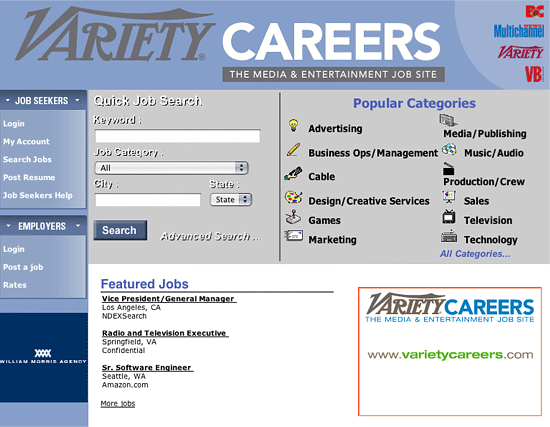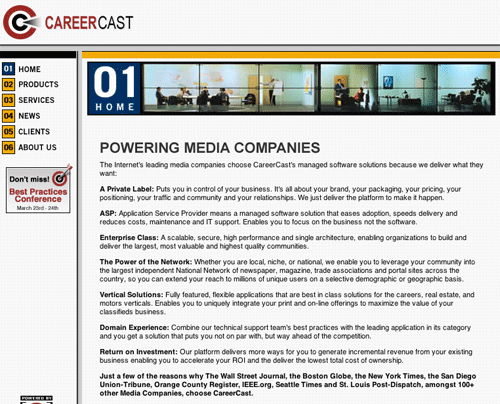Online job advertising represents a steadily increasing share of the job recruitment industry, with a rate of revenue growth in 2004 that far exceeded that of traditional print classifieds. In October 2004, Reed Business Information (RBI) launched its own branded job recruitment site, called VarietyCareers, and expects to make a significant impact on this burgeoning industry in the market segments that it knows best—media and entertainment.
VarietyCareers is a stand-alone website linked to RBI’s four magazines that make up The Variety Group: Variety, Broadcasting and Cable, Multichannel News, and Video Business. Similar to the operations of other online job boards, companies pay VarietyCareers a fee to post jobs and search resumes, while job seekers can search the site for jobs and submit resumes for free. Since October, anyone searching for a job on any of The Variety Group’s magazine sites automatically arrives at VarietyCareers. 
“We advertise all over those sites, as well as in the related print publications,” says Jennifer Glen, director of recruitment sales. “A national ad campaign is also underway.” Glen, who heads up the new venture and also oversees the employment classifieds in the print version of Variety, had been Regional Sales Manager for Yahoo! HotJobs in Boston and New York prior to joining RBI’s new venture in summer 2004.
Variety and the Entertainment Industry
“Variety, which is celebrating its 100th anniversary this year, is the #1 publication for the entertainment industry,” notes Glen. “For many years, people in the industry have depended on the magazine for its industry news, archived material, box-office reports and classified section,” she says. “We did a lot of due diligence and research, including meetings with high-level human resources people in leading entertainment industry, to determine if there was a need for an online job recruiting site targeted specifically to media and entertainment jobs. The answer,” she says, “was a resounding YES!”
Entertainment alone is a $500 billion industry, employing nearly 1.5 million people in the United States. Most companies in the entertainment industry have been using headhunters to fill positions or posting jobs on one of the general online job boards (e.g., CareerBuilders, HotJobs, Monster). But recruitment is very much online now. Estimated revenues for entertainment and media job postings total nearly $9 million today and are projected to grow to nearly $16 million by 2007.
“We felt we could use the power of our publications to provide an audience for the job recruitment needs of media and entertainment companies,” says Glen. “That was our motivation. The need appeared to be very big, and our resources seemed like a sure fit. To us, it was like money on the table.”
In fact, revenues in the $7 billion job recruitment business are migrating from traditional print to online faster than in any other important advertising category, according to Corzen, Inc., a New York City-based research firm that tracks trends in marketplaces that are undergoing fundamental changes. In 2003, nearly 20 percent of job recruitment advertising was generated online, compared to only 3 percent in 2000. Corzen expects online recruitment revenues to surpass those from traditional print sources in 2008.
CareerCast, Inc.
VarietyCareers.com is powered by CareerCast, an application service provider (ASP) that also powers online classified sites for The Wall Street Journal, The New York Times, the AMA and several other organizations ranging in size from huge to tiny. CareerCast provides all the backend technology and handles all the technical details, but the client owns and controls its own site, the relationship with its users, the traffic and the sales. 
“If you just want to put up a job board on your site, you might affiliate with Monster or HotJobs or a company like that,” says Rick Miller, president and CEO of CareerCast. “But if you have a legacy business, you don’t want to give it away. CareerCast is not a destination site. We simply enable the job boards of our partners.”
Of course, it’s neither simple nor inexpensive to create a robust job recruitment site—or any robust site, for that matter—if that is not your primary business. That is why the interest in ASPs has surged in recent years. “It costs megabucks to develop the technology and run a platform like ours,” explains Miller. “The big players such as The New York Times or The Wall Street Journal can certainly afford to spend the $5 million it might cost to duplicate our platform, but they’re not interested when they can get the same results from us for pennies on the dollar—and still own their own site. By deploying an enterprise-class database application that is highly scalable, we can have a lot of clients running on it—with everyone’s data carefully segregated and locked—for a reasonable price per client.”
| “The ASP model also offers an equal opportunity to all clients, regardless of size, to use the full capability of its system and any or all of its services, according to Miller.
“The platform is highly configurable, and each client can control its own site’s appearance, add advertising, and set its own prices for postings, packages, discounts, etc.” |
Annual license fees, however, are usage-based and range from $10,000 to $700,000 for CareerCast’s current clients, according to Miller, with supplementary charges for any special features the client may choose. The Boston Globe, for example, may have 25,000 jobs posted on its site on any given day and 700,000-or-so unique visitors per month. On the other hand, a small client with 200-or-so jobs posted may have only 500 or 1,000 unique visitors per month.
“We also offer 19 revenue-generating [to both the client and to CareerCast] upsell options, such as featured jobs, spotlighted jobs, national networks, bolding, colorizing, and so on,” he explains. “That’s not to make it complicated nor to nickel-and-dime everything; rather, it’s to accommodate the small sites that shouldn’t have to pay for features they don’t want or need. But they’re available to those that do want them. Most of our clients start simple and add extras over time.”
As for the e-commerce element, about 65-70 percent of CareerCast’s clients process payments through its accounting department and receive monthly disbursements. Some larger clients prefer to do it themselves. Reporting is built into the system, and clients can check the reports online at any moment in time.
Development of VarietyCareers
VarietyCareers had more than 3,500 jobs posted when it launched and logged close to 20,000 unique visitors per day on some days in January. Jobseekers are currently posting well over 100 resumes per day. “We’re not even six months into this,” says Glen, “so that traffic, along with the number of resumes we’re getting on a daily basis, is how I’m gauging success right now. And I’d say it looks pretty good.”
VarietyCareers posts its basic pricing on its site, and companies can easily post jobs themselves and pay by credit card. The basic cost to post one job is $205 for 30 days, plus the cost of any added features the company might select. Glen also has a sales team whose focus is to create customized packages for companies with frequent, ongoing or large-scale job recruitment needs. In addition to volume discounts, those packages might include special services such as exclusive positioning, extracting all jobs posted on the company’s own website and populating them on the VarietyCareers site, providing a password-protected area where they can make changes on their own, and more. “We’re very flexible,” says Glen.
One thing to keep in mind when considering the experience and motivation of VarietyCareers is that Variety magazine didn’t just add a job board to its own website, even though that may appear to be the case to site visitors. VarietyCareers is a freestanding product, a separate division within The Variety Group, with a department full of marketing, sales, customer service, and site administration people. “That’s a huge difference,” says Glen, whose background in online job recruitment is obviously one of the program’s keys to success.
| “Nevertheless, the ASP model is a way for publishers, whether large or small, to add a powerful online job board to their sites—and still maintain complete ownership and control—for little money and less time.
“One person making decisions and managing the relationship with the outsourcer may be all that is required.” |
Trade magazines, in particular, have captured a niche that could comprise only a few thousand people. And many of these publications already carry classified advertising in their print versions. Offering a targeted online job recruitment service would provide a valuable benefit for the industry—to individual readers and to companies alike—and also help to affirm the publication’s position as the industry source.
An ASP solution is cost-efficient, and the returns can be significant. Do the math. A small publisher with minimal site traffic and paying $10,000 per year to CareerCast, for example, would need to sell only five job postings a month at $175 each to break even. Except for any in-house management expenses attributed to the program, everything above those five postings is gravy.
Even so, Glen stresses the importance of doing a lot of research before embarking on such a program to determine the need, to see how your publication fits in the marketplace, and then to decide how it should be presented to the community. It’s too soon for VarietyCareers to have gathered any meaningful feedback from its customers, as the hiring process itself often takes three months to complete. So far, however, it appears to be “definitely successful,” she says. “We’re thrilled.”



Im looking for a position as a gaffer or pa. 321 805 2216. Dave